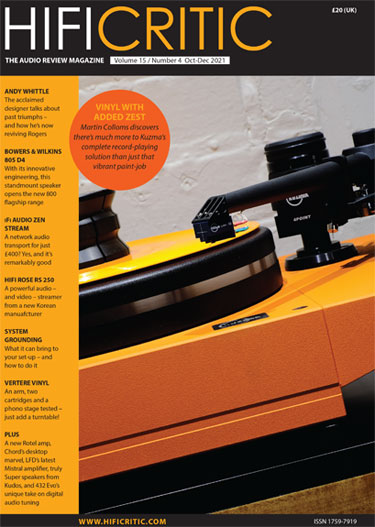|
|
| Home | High-End Audio Reviews | Audiophile Show Reports | Partner Mags | Hi-Fi / Music News | |
|
|
Celebrating 30 Years Of Service To Music Lovers |
![]()
Volume 15 Number 4
July / August / September 2021
What The Audio Industry Can Do....
A flavour of exploring ways of making more of what you have.
Editorial By Martin Colloms
Alan Sircom, editor at HI Fi+ (issue 198, November 2021), prompted by COP26, asks what the audio industry can do to combat climate change. It's an interesting question, but may run contrary to traditional business models for audio, where upscaling and upgrading drives the hi-fi economy. Magazines thrive on a seemingly endless stream of new and improved product and audio technology, while a large proportion of readers continue to prefer paper copies made from trees and finished with inks, laminates and varnishes made from petrochemicals. And then there is the physical transportation.
Perhaps we should resist the call for the new, for endless renewal, which is unfortunately a habit encouraged by our industry claiming just a bit more of this and a bit more of that for improved audio reproduction. And we don't help by reviewing and publicising still more new introductions in seemingly endless new product reviews. Possible solutions include greater product retention, resisting the temptation to get more and better. Also, we should aim to lengthen renewal cycles: some products are very long-lived and may be overhauled every five or ten years, essentially reviving them, rather than being chucked and replaced. Naim Audio, amongst others, have a comprehensive programme where older designs are eligible for a primary service, notably replacing the power supply capacitors plus other odds and ends, contact cleaning and the like.
That's a sensible policy: the condition of the main power supply capacitors is key. These 'chemical' electrolytic technology components age – even if little used, but more so if used a lot. Moreover capacitor quality has improved over the years with lower ESR (equivalent series resistance) now maintained over a wider frequency range. Indeed, your favourite long-serving product may even come back from overhaul sounding better than new, due to the installation of these improved components. If you buy new, something may well get scrapped, but not if you buy 'serviced and secondhand' and pass the superceded product back into the 'pre-loved' market.
On the plus side, consumer audio equipment has a much longer lifetime than most products, and the scrap rate is low, sustaining that healthy second- and third-user market. Yet we need to audit how much raw material and energy is required to construct audio equipment. A huge proportion is imported: even if the product is assembled in the UK, most of the parts save the casework are imported.
Loudspeakers are an obvious exception where the UK is strong and a greater proportion of the build is originated here, although the use of imported drive units is relatively common, along with the electronic components used in the crossovers. For other products nearly all of the parts are imported, 'shipped' in and made with exotic – and environmentally costly – materials, including neodymium, nickel, copper, cadmium, silver, and advanced polymers and structural resins.
Perhaps we should think twice about 'large and heavier', and perhaps choose 'smaller and better'. Just how important is that almost imperceptible 2dB of extra loudness from a more powerful amplifier, or that particular nuance of quality identified by a bat-eared critic? With apologies to the valve-tube aficionados, over the medium term these amplifiers consume – for the same output power as solid state – perhaps four or even six times the supply current from the wall socket, and inevitably enjoy a shorter working life.
Notwithstanding the above, as you can see opposite for this issue we offer an ambitious program of product reviews and features, beginning with our interview with the redoubtable Andy Whittle, who has helped steer Rogers through structural and economic storms to its present UK-based revival, complete with local manufacturing of its new products. Meanwhile, there's also a flavour of exploring ways of making more of what you have: after much prevarication I've tackled the versatile Townshend Podium vibration-isolating platforms for loudspeakers, while Kevin Fiske considers the benefits of improved grounding when it comes to optimising system performance.
However you listen in these interesting times, may I wish you – on behalf of the whole HIFICRITIC team – the compliments of the season, and a peaceful and prosperous 2022.
– Martin Colloms
Editor-In-Chief
Subscribe To HIFICRITIC!
![]()
Click
here to subscribe to HIFICRITIC

 High-Performance Audio Reviews
High-Performance Audio Reviews

















